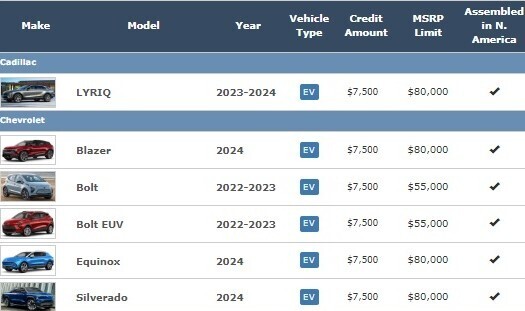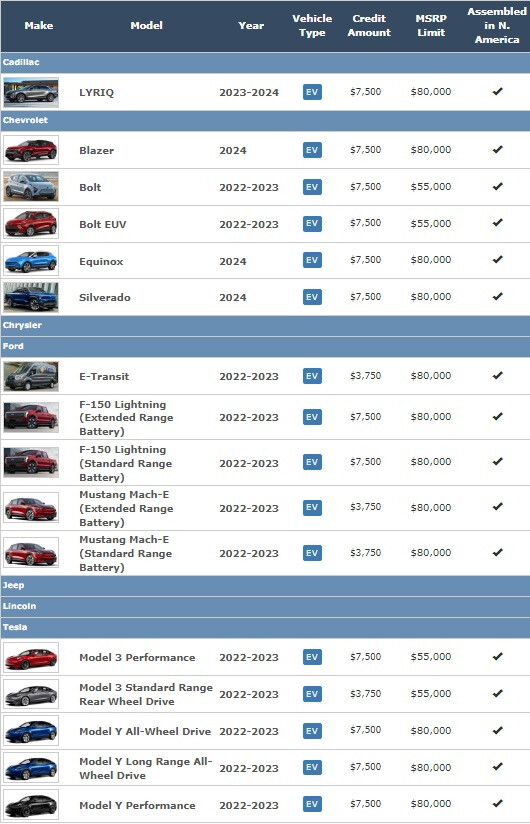hankyoreh
Links to other country sites 다른 나라 사이트 링크
Only American EVs eligible for US clean vehicle tax credit

Only electric vehicles made by US companies have been selected to be eligible for up to US$7,500 in tax credits from the US government under the Inflation Reduction Act.
That leaves out not only Korean automakers Hyundai and Kia but also the Japanese and German automakers that were originally deemed eligible for the subsidies.
The US Department of the Treasury and Department of Energy announced Monday that 16 electric vehicles and six plug-in hybrids had been selected as qualifying for the clean vehicle credit according to the Inflation Reduction Act, which took effect last August, and the detailed guidebook that was subsequently released.
The biggest beneficiaries of the announcement are Tesla and General Motors (GM). Among the six vehicles in Tesla’s top-selling Model 3 and Model Y lines, five are eligible for the full US$7,500 credit while just one is capped at US$3,750.
GM’s low-cost Chevrolet Volt and an SUV and pickup truck scheduled to go on sale this year were all deemed eligible for the full subsidy.
In Ford’s F-150 Lightning line of pickup trucks, two vehicles will qualify for the full US$7,500 credit while the other two will still be eligible for a US$3,750 credit.
Buyers of the Cadillac Lyriq can also claim US$7,500 from the government.
Chrysler’s Pacifica is one of just six plug-in hybrids, all from US automakers, that are eligible for credits ranging from US$3,750 to US$7,500.
As expected, not a single electric vehicle made by Hyundai or Kia will be eligible for IRA tax breaks.

The G70, which Hyundai Motor has been producing since March 2023 at its Alabama factory, met the condition of having North America as its final production site but was not selected due to the fact that its batteries are sourced from China.
Ten different models that had been eligible for tax credits by past standards — including some EVs made by the Japanese company Nissan and Germany’s Volkswagen — were denied them based on the new standards.
The detailed guidelines for the IRA state that a tax credit of US$3,750 is available as of this year for EVs with North America as their final production site, provided that their batteries have at least 50% of their components manufactured and assembled in North America.
Another credit of US$3,750 is given when at least 40% of the key minerals in batteries have been mined and processed either in the US or in a country that has a free trade agreement with the US. Both conditions must be met for the full US$7,500 tax credit to be granted.
In terms of consumer prices, the credits are available for cars costing US$55,000 or less and SUVs, vans, and pick-up trucks costing up to US$80,000.
Based on these criteria for tax credit selection, EVs made by US companies gain a considerable advantage in the US market. Tesla, which holds a share of more than 60% of the US EV market, has been aggressively marketing lower-cost vehicles — part of an attempt to benefit from the EV tax credit system to retain its market dominance.
“The selection of only US companies to benefit from tax credits is meant to achieve the target of US-centered manufacturing growth,” said one industry official.
By Lee Bon-young, Washington correspondent
Please direct questions or comments to [english@hani.co.kr]

Editorial・opinion
![[Guest essay] Preventing Korean Peninsula from becoming front line of new cold war [Guest essay] Preventing Korean Peninsula from becoming front line of new cold war](https://flexible.img.hani.co.kr/flexible/normal/500/300/imgdb/original/2024/0507/7217150679227807.jpg) [Guest essay] Preventing Korean Peninsula from becoming front line of new cold war
[Guest essay] Preventing Korean Peninsula from becoming front line of new cold war![[Column] The state is back — but is it in business? [Column] The state is back — but is it in business?](https://flexible.img.hani.co.kr/flexible/normal/500/300/imgdb/original/2024/0506/8217149564092725.jpg) [Column] The state is back — but is it in business?
[Column] The state is back — but is it in business?- [Column] Life on our Trisolaris
- [Editorial] Penalties for airing allegations against Korea’s first lady endanger free press
- [Editorial] Yoon must halt procurement of SM-3 interceptor missiles
- [Guest essay] Maybe Korea’s rapid population decline is an opportunity, not a crisis
- [Column] Can Yoon steer diplomacy with Russia, China back on track?
- [Column] Season 2 of special prosecutor probe may be coming to Korea soon
- [Column] Park Geun-hye déjà vu in Yoon Suk-yeol
- [Editorial] New weight of N. Korea’s nuclear threats makes dialogue all the more urgent
Most viewed articles
- 1Behind-the-times gender change regulations leave trans Koreans in the lurch
- 2Family that exposed military cover-up of loved one’s death reflect on Marine’s death
- 3Japan says its directives were aimed at increasing Line’s security, not pushing Naver buyout
- 4Yoon’s revival of civil affairs senior secretary criticized as shield against judicial scrutiny
- 5Marines who survived flood that killed colleague urge president to OK special counsel probe
- 6Unexpected rate of AI development requires timely discussion of side effects
- 7[Guest essay] Preventing Korean Peninsula from becoming front line of new cold war
- 8[Guest essay] Maybe Korea’s rapid population decline is an opportunity, not a crisis
- 9A breath of fresh air: Innovative architecture in the time of COVID-19
- 10S. Korean first lady likely to face questioning by prosecutors over Dior handbag scandal